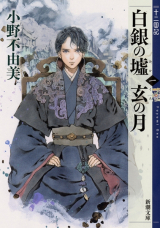2019/11/29 |
The Twelve Kingdoms – Fans’ 18 Year Wait Comes to an End |
|---|

Digest by Japanese Writers’ House
The newest title in the bestselling series The Twelve Kingdoms, the first full-length novel in 18 years, has seen extraordinary sales since it first hit stores in October. The series’ publisher, Shinchosha, had expected high sales based on the online reaction to the book’s announcement, but stated that the 2,540,000 copies sold in just two months was “more than we had expected.” Other books in the series that have already been published have also been selling well as a result, and the series as a whole has now sold over 12,000,000 copies. Even after such a long wait between books, how has the series remained so popular?
The series is set in a parallel world that draws from Ancient China, with eight kingdoms on an island shaped like a lotus, and four other kingdoms on separate islands around the main island. Boys and girls who are suddenly transported to this land become rulers and assistants, and the stories depict their growth as they work to help the people of the kingdoms. While the series was originally marketed towards a female readership upon the first book’s publication in 1992, the marketing soon expanded to encompass a broader audience.
Fans of all ages have been charmed by the series, with a mother and daughter lining up together at a book store in Chiba Prefecture’s Ichihara City. Reina Suzuki (18) had been introduced to the series by her mother Reiko (49), a long-time fan of the series, when she was in elementary school. “I’d never read a book with such an elaborately detailed setting before.” For Reiko, she began reading the series while working as a librarian in a middle school, where it was recommended to her by a student. “I think that the joy of reading a story where characters struggle with and inevitably overcome many obstacles is one that transcends generations.” Reiko said.
Professor Akemi Itsuji of Shirayuri University, who studies fantasy literature, points to the setting of a parallel world that combines mythology with an almost game-like set of rules as being an element that resonates with the series’ large female readership. Each king is chosen by to one of twelve divine beasts called kirin (who normally appear in human form), who represent a certain kingdom and act on the will of a divine being. “If you are chosen by a kirin, then you are made king, regardless of age or gender. While this was originally a way to avoid female protagonists being given restrictive roles, it ended up establishing a gender-free situation. Reading this today, it ends up seeming quite modern.”
In addition, literary critic Jirō Kitagami praises the way the series transcends the framework of traditional fantasy and “realistically depicts peoples’ lives.” The characters in this parallel world struggle with corrupt administrations and poverty, while never abandoning their search for the best way forwards. “Hefty themes like what the best path for living your life is, and what it means to trust someone, are woven into a skilfully written story. I am sure that even people who don’t like fantasy will find themselves getting hooked if they start reading this series.”
Article originally posted in Asahi Shimbun November 21st 2019
